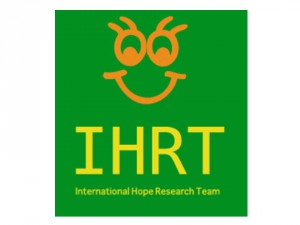ONGOING REASEARCH TEAMS
From 2023: EQui-T – European Quality Development System for Inclusive Education and Teacher Training
On 15th June 2023, the EQui-T project was launched – European Quality Development System for Inclusive Education and Teacher Training founded by the European Commission under the Erasmus+ project. This project lasts 3 years, from June 2023 to June 2026, and sees the participation of 7 partner universities to develop an inclusive digital teaching methodology in Europe. The focus is therefore on the teaching methodology and study of materials in the form of Open Educational Resources (OER) for inclusive teaching – Open Inclusive Educational Resources (OIER).
The goal of this project is, therefore, to support teachers to identify, produce and share high-quality OIER. To do this, one of the key goal of the EQui-T project is to build a transactional network of inclusive education, to promote a national and international exchange of good practices.
For more information on the programs click here.
From 2022:
– SELF-IN Project
The La.R.I.O.S. Laboratory is a partner of the international SELF-IN project. The project aims to increase the levels of self-determination and independence of people with intellectual disabilities, through the sharing of materials and tools and the holding of training courses aimed at interested educators, and male and female professionals.
For more information on the programs, goals and activities of the project click here.
PR1 Workbook click here.
PR2 SLP Course click here.
– InteLACMarket: Integration, Counselling and Upskilling of Migrants and Refugees from Latin America and the Caribbean into the Labour Market
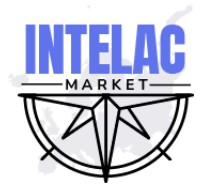 La.R.I.O.S. members are part of this european project with the aim of tackle the challenge of integrating migrants and refugees from Latin America and the Caribbean (LAC) into the European labour market. The project brings together experienced partners and academia, and promotes a network of cooperation from countries that are amongst the most affected. To achieve this, the project aims to develop and pilot research-based educational training, as well as guidance and counselling for refugees and migrants from LAC countries to develop their potential to become active and productive members of society.
La.R.I.O.S. members are part of this european project with the aim of tackle the challenge of integrating migrants and refugees from Latin America and the Caribbean (LAC) into the European labour market. The project brings together experienced partners and academia, and promotes a network of cooperation from countries that are amongst the most affected. To achieve this, the project aims to develop and pilot research-based educational training, as well as guidance and counselling for refugees and migrants from LAC countries to develop their potential to become active and productive members of society.
For more information visit the InterLACMarket website.
Newsletter n. 1 click here.
Newsletter n. 2 click here.
Newsletter n. 3 click here.
From 2018: UniTwin international network “Life Designing Interventions (counseling, guidance, education) for decent work and sustainable development”. UNESCO Chair
 La.R.I.O.S. members are part of this international network that promotes international cooperation between universities on lifelong guidance and counselling to support decent work and sustainable development. The project brings together the following universities: Adam Mickiewicz University; Catholic University of the West; Conservatoire national des arts et métiers; Laval University; Lesley University; University of Bordeaux; University of Buenos Aires; University of Coimbra; University of Eastern Finland; University of Florence; University of Iceland; University of Lausanne; University of Lisbon; University of Lower Silesia; University of Mons; University of Padova; University of Pretoria; University of Sao Paulo; University of Wroclaw.
La.R.I.O.S. members are part of this international network that promotes international cooperation between universities on lifelong guidance and counselling to support decent work and sustainable development. The project brings together the following universities: Adam Mickiewicz University; Catholic University of the West; Conservatoire national des arts et métiers; Laval University; Lesley University; University of Bordeaux; University of Buenos Aires; University of Coimbra; University of Eastern Finland; University of Florence; University of Iceland; University of Lausanne; University of Lisbon; University of Lower Silesia; University of Mons; University of Padova; University of Pretoria; University of Sao Paulo; University of Wroclaw.
For more information visit the UniTwin website.
European Doctoral Programme in Career Guidance and Counselling (ECADOC)
 ECADOC aims to train future academic leaders and professionals in the field of career guidance and career counselling and organises annual summer schools for PhD students in the field of career guidance. The programme is a joint initiative of the European Society for Vocational Designing and Career Counseling (ESVDC) and the Foundation of the Network for Innovation in Career Guidance and Counselling in Europe (NICE Foundation), and is supported by higher education institutions from over 10 European countries.
ECADOC aims to train future academic leaders and professionals in the field of career guidance and career counselling and organises annual summer schools for PhD students in the field of career guidance. The programme is a joint initiative of the European Society for Vocational Designing and Career Counseling (ESVDC) and the Foundation of the Network for Innovation in Career Guidance and Counselling in Europe (NICE Foundation), and is supported by higher education institutions from over 10 European countries.
For more information visit the ECADOC website.
Life Design International Research Group
 Prof. Salvatore Soresi and prof. Laura Nota are members of the ‘Life Design International Research Group’ that aims to identify future horizons of Vocational Psychology. This team includes: Jean-Pierre Dauwalder (University of Lausanne, Switzerland), Maria Eduarda Duarte (Universidade de Lisboa), Jean Guichard (Institut National d’Etude du Travail et d’Orientation Professionnelle – Conservatoire National des Arts et Métiers, Paris, France), Jérôme Rossier (Institute of Psychology, University of Lausanne, Switzerland), Mark Savickas (Behavioral Sciences Department; Northeastern Ohio University College of Medicine, USA), Raoul Van Esbroeck (Vrije Universiteit Brussel, Belgium), Annelies E.M. van Vianen (University of Amsterdam).
Prof. Salvatore Soresi and prof. Laura Nota are members of the ‘Life Design International Research Group’ that aims to identify future horizons of Vocational Psychology. This team includes: Jean-Pierre Dauwalder (University of Lausanne, Switzerland), Maria Eduarda Duarte (Universidade de Lisboa), Jean Guichard (Institut National d’Etude du Travail et d’Orientation Professionnelle – Conservatoire National des Arts et Métiers, Paris, France), Jérôme Rossier (Institute of Psychology, University of Lausanne, Switzerland), Mark Savickas (Behavioral Sciences Department; Northeastern Ohio University College of Medicine, USA), Raoul Van Esbroeck (Vrije Universiteit Brussel, Belgium), Annelies E.M. van Vianen (University of Amsterdam).
CONCLUDED RESEARCH TEAMS
Counselling for Refugee and Migrant Integration into the Labour Market – Development of Courses for Higher Education and Public Employment Services (CMinaR)
The members of Larios are part of this research group which, within the CMinaR project, co-financed by the Erasmus+ programme, aims to develop a curriculum for the training of professionals interested in the professional construction of refugees. The project brings together the following universities: Hochschule der bundesagentur fue (Applicant); University of Padua; Stockholms Universitet; Istanbul teknik universitesi; Canterbury Christ Church University; Kauno technologijos Universiteta.
For more information about the project visit the CMinaR website.
International Hope Research Team
In 2012 this national and international research group was formed to study the constructs of hope, optimism, resilience and time perspective in counselling and career counselling.
Introduction
Research Lines
Courage Research Group
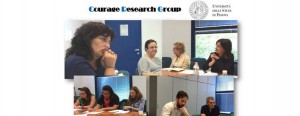 On August 26th, 2014 the “Courage Research Group” has been founded at the Department of Philosophy, Education and Applied Psychology, University of Padova.
On August 26th, 2014 the “Courage Research Group” has been founded at the Department of Philosophy, Education and Applied Psychology, University of Padova.
The research group is composed by:
prof. Dora Capozza, prof. Lea Ferrari, prof. Laura Nota, prof. Teresa Maria Sgaramella, prof. Salvatore Soresi, prof. Ines Testoni, dr. Gian Antonio Di Bernardo, dr. Ilaria Di Maggio, dr. Rossella Falvo, dr. Maria Cristina Ginevra, dr. Ariela Pagani, dr. Sara Santilli.
In this period of economic crisis, many people, in particular those are vulnerable, experience uncertainty for future, precariousness, and many career barriers. Therefore, the goal of this research group is to focus on crucial dimensions to help people to overcome today’ society difficulties. In the first meeting of the research group, the following aims have been decided:
– studying courage and its theoretical models;
– develop and adapt qualitative and quantitative assessment instruments;
– focusing on common research projects;
– involving other Italian and international colleagues in this project.
The group is open to anyone interested.
Group meeting: 1st meeting Courage Research Group
The Career Adaptability International Collaborative
La.R.I.O.S. researchers are members of this International team that was born in Berlin, 2008, that involve scholars of 15 European and extra-European countries.
This collaboration, guided by M. Savickas, aims to develop career development models and cross-culture measures focusing on career adaptability. A 50 items-instrument, “Career Adapt-Abilities Inventory” has just been developed in order to test career adaptability. The translation and adaptation of this instrument by the diverse national research teams is in progress.
University Network for Innovation in Guidance Erasmus-NICE
The La.R.I.O.S. laboratory represents Italy in the project named “University Network for Innovation in Guidance” granted by European Union and coordinated by professor C. Schiersmann, Ruppercht Karls University of Heidelberg. Specifically the La.R.I.O.S. laboratory is involved in the working group “New themes, new challenges – Innovation: Identify and develop further innovative training” coordinated by prof. J. Guichard, the Organisation de l’INETOP/CNAM, Paris, and it aims to collect and spread, referring to Life Design approach, career adaptability assessment measures.
http://www.nice-network.eu/
The Network for Innovation in Career Guidance and Counselling in Europe 2 (NICE 2)
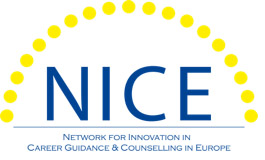
The Network for Innovation in Career Guidance and Counselling in Europe 2 involves 45 partners from 28 European countries. Most of them are higher education institutions that offer degree programmes in career guidance and counselling or engage in related research. Supported financially through the European Commission, the members of NICE 2 will engage in several activities to enhance academic cooperation in our field from 2012 to 2015. Important projects within the “NICE 2” programme will be:
- the formulation of a joint memorandum on the role of higher education in career guidance and counselling,
- the development and testing of common points of reference for the academic training of career guidance and counselling professionals (e.g. the NICE Core Competences),
- activities to support the exchange of lecturers, researchers and students between the participating institutions, and
- the development of a sustainable infrastructure for future networking, including an online community and database.
The NICE 2 programme will be accompanied by many international workshops and three large conferences. In particular, a wide range of actors interested in the academic training and research in career guidance and counselling (including policy-makers, members of professional associations, and representatives of research and training institutions) will be invited to a large international conference in Canterbury from September 3-6 in 2014. For more information about NICE, please visit the homepage www.nice-network.eu
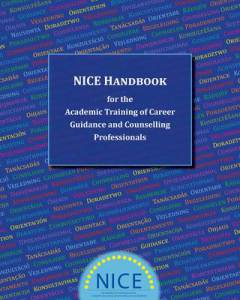 NICE Handbook for the Training of Career Guidance and Counselling Professionals
NICE Handbook for the Training of Career Guidance and Counselling Professionals
European Competence Standards for the Academic Training of Career Professionals
Memorandum on Academic Training and Research in Career Guidance and Counselling
FURTHER INTERNATIONAL COLLABORATION
- Analysis of the relationships between self-efficacy beliefs and Job satisfaction, in collaboration with the University of Maryland, Maryland, USA (prof. Robert Lent) and the Loyola University Chicago (prof. Steven Brown).
- Analysis of perceived support, self-efficacy beliefs and school career indecision, in collaboration with the University of Wisconsin – Madison, USA (prof. Scott Solberg).
- Analysis of the relationships between decisional styles, self-efficacy beliefs and coping strategies, in collaboration with the University of Melbourne, Australia (prof. Leon Mann).
- Analysis of problem solving abilities, in collaboration with the Missouri University, USA (prof. Puncky P. Heppner and Mary Heppner).
- Analysis of self-determination and career choice in adolescents and persons with disability, in collaboration with the Kansas University Center on Developmental Disabilities, USA (prof. Michael L. Wehmeyer).
- Analysis of professional interests in children and young adolescents, in collaboration with the Arizona State University, USA (prof. Terence Tracey) .
- Analysis of the relationships among parents support and the development of interests in children, in collaboration with the Cleveland University, USA (Donna P. Schulteiss).
- Analysis of concept of work, study and leisure time, in collaboration with the Boston College, USA (prof. David Blustein) and the Ben Gurion University, Israel (prof. Hanoch Flum).
- Analysis of coping strategies in young and old adolescents, in collaboration with the Melbourne University, Australia (prof. Erika Frydenberg).
- Analysis of the relationships among parents and children perceptions and attitudes toward work, in collaboration with the Northeastern Ohio Universities College of Medicine, USA (prof. Erik Porfeli).
- Analysis of career interests in children and adolescents with the University at Buffalo, USA (prof. Sandro M. Sodano).
- Analysis of career decision making difficulties in collaboration with the Hebrew University, Jerusalem, Israele (prof. Itamar Gati).


